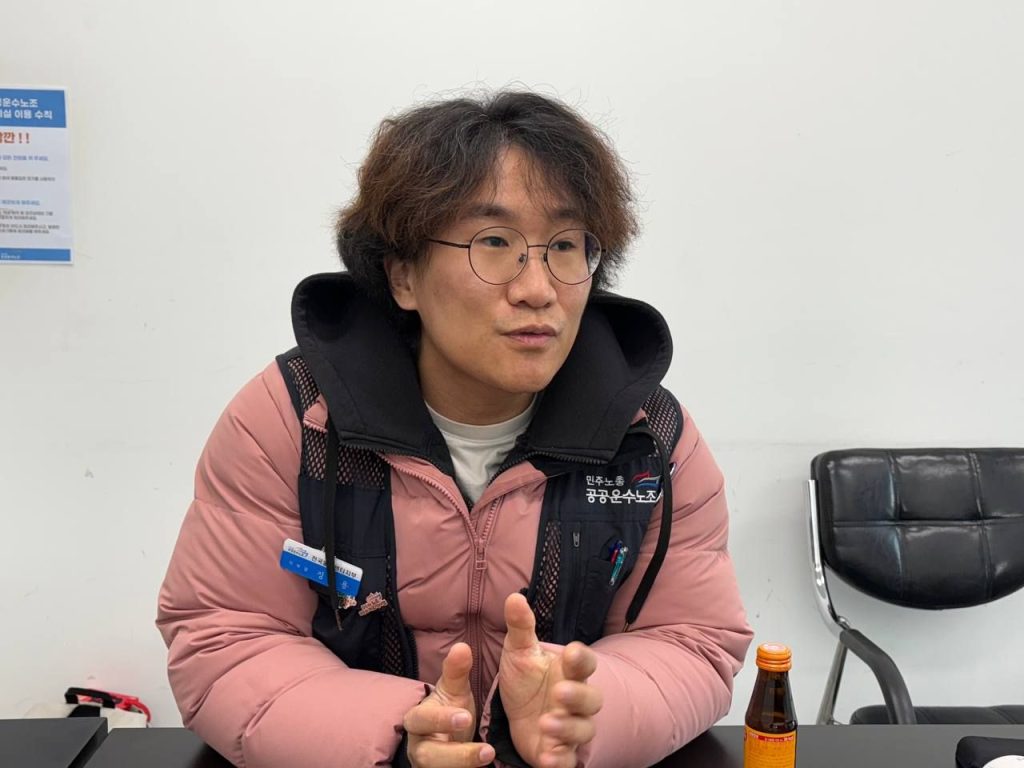Long working hours and night work encourage overwork – Need for corporate regulation and monitoring
An interview with Seong-yong Jeong, the head of the National Logistics Center Branch of the Public Transport Workers Union
Cheong-hee Yoo and Yong-hyeon Im
KILSH Activists
Translated by Michelle Jang
Korea Institute of Labor Safety and Health

The repeated deaths of Coupang workers from overwork have clearly revealed how the collusion between capital and political power has undermined workers’ right to health. As important as the removal of President Yoon Seok-yeol is, extending the democracy won in the public square to the workplace and society as a whole is even more important. On January 23rd, we met and talked with Seong-yong Jeong, the head of the National Logistics Center Branch of the Public Transport Workers’ Union.
KILSH: The Yoon Seok-yeol administration has been fiercely pushing for flexible working hours since the beginning of its term. What is the first scene that comes to mind in relation to that?
Seong-yong Jeong: Since the site I work at is a logistics center, I don’t think I can talk about it without mentioning the issue of overwork deaths at Coupang. In the past five years since the establishment of the Coupang Logistics Center Branch in 2020, 19 people have died while working at Coupang, and 12 of them were working at night. In fact, even if a new government comes in, I don’t have high expectations about whether they will be able to regulate Coupang’s ‘rocket delivery’ and night work. First of all, we can’t ignore the fact that Coupang is putting a lot of effort into lobbying the government. Another question is whether any government will be able to solve the situation where night work and long working hours are spreading along with the tremendous growth of the logistics industry.
KILSH: In addition, the government has been blatantly trying to abolish working hour regulations. President Yoon Suk-yeol initially proposed 120 hours per week and later suggested 69 hours per week.
Seong-yong Jeong: That’s right. For example, the logistics industry is a ‘special working hour industry’ that does not have to set a maximum of 52 hours per week for overtime. Coupang Fulfillment Service (which operates Coupang’s logistics center) is also classified as a transportation-related service industry, so it can work overtime exceeding 12 hours per week. In fact, it is incomprehensible that the government has opened the way for industries that are not related to transportation to be subject to special working hour regulations. It has created all sorts of exceptions to allow for a roundabout way to avoid working hour regulations.
KILSH: Discussions on introducing a ‘4-day workweek’ are expected to be in earnest amidst the rapidly changing political situation. There is a concern that the issue of working hours is also becoming more polarized.
Seong-yong Jeong: A 4-day workweek…Even though it’s worth a try, to be honest, there’s a part of you that wonders, “Can I make a living like that?” The lower the wage level, the more likely to work long hours to make a living. Coupang talked about Deok-jun Jang, who passed away while working as a day laborer at a Coupang logistics center, by saying that since he was a day laborer, he could come in whenever he wanted and rest if he didn’t want to work. Coupang said that Jang insisted on working when he wasn’t even asked to, so he died while working. In other words, Coupang is saying that, “Death from overwork is the individual’s responsibility.” The argument that day laborers can freely choose their work days is actually a far-fetched claim. Instead, day laborers have to prove every day that they can skillfully handle the workload that Coupang demands.
For those who are in a pinch for money, there is no other choice than long working hours or fixed night work. That is why the idea of a 4-day workweek seems a bit far away. It is bitter reality that the problems of overwork deaths occurring in workplaces like ours are invisible because it appears that working long hours is a voluntary activity.
KILSH: There are voices calling for a fundamental change in the world, not just the removal of President Yoon Seok-yeol. What do you think is the most necessary change to make a workplace without death from overwork?
Seong-yong Jeong: Coupang introduced a system called the ‘full attendance allowance’ three years ago. If you work full time for a month, you get a 140,000 won (~USD$97) bonus . In order to receive the allowance, you can’t miss a single day of work, and you can’t even get the allowance if you use unpaid sick leave. Workers need to be able to rest when they’re sick so that they can work healthily. However, if you miss a day, you lose 100,000 won (~USD $70) per day and the full attendance allowance of 140,000 won all at once. In this situation, who would think of taking a full day off because they’re sick?
In the end, I think that only when the minimum wage is raised significantly, can we can get rid of the shackles of long working hours and night work. We can’t blame workers for choosing to work too much because their hourly wage is low, right? That’s why it’s also important to legally regulate companies that cause deaths from overwork. When working hour regulations are working properly, I think a proposal like “Let’s unite as a union and raise the hourly wage,” will be appealing to the workers.
Comments